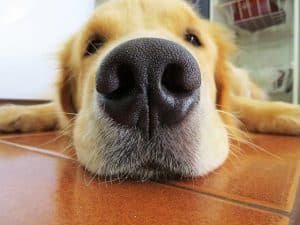There is a difference between nasal discharge due to an infection and a normal wet nose in cats. In most cases, many people cannot differentiate between the two. There are times when people get worried just to realize that a wet nose in their feline is normal.
Nasal discharge in cats comes from the upper respiratory organs. These organs include postnasal area, nasal cavities, and sinuses. Normally, these organs shouldn’t produce any discharge. In case of a discharge, therefore, it means that something is wrong.

On the other hand, these always have wet noses. In fact, cats that have extremely dry noses are considered unhealthy. The wetness maybe because of varied factors such as normal mucus or even licking.
Contents
When is the cat wet nose normal?
Cat nose dripping is considered normal and a sign of overall good health. According to Wetwest.com, felines should always have a warm, wet nose. However, if it becomes cold and wet, it might mean otherwise.
Normal wetness among these pets is usually due to the following:
It helps in sensing scents
As we all know, cats can sense scents. It can follow the scent of the place where you are hiding meat. There is a layer of mucus on its nose that helps in this. Scents dissolve in this mucous before being transferred to the brain for decoding.
What does this tell you? Cat wet nose is normal. Without that mucus on the nose, it cannot detect any scent.
Wet nose to help in cooling
Felines use moisture and mucous on the nose to regulate their internal body temperatures. In the process, they assist the body to cool down.
You should note that just like dogs, felines do not sweat since they don’t have sweat glands. Therefore, the wet nose plays a significant role in keeping the cat’s body cool.
When is a wet nose on a feline abnormal?
There are instances when nasal discharge in cats needs to be checked. In such instances, the discharge is watery and clear. In other instances, it may be in the form of thick mucus. In extreme cases, a nasal discharge may have pus or blood spots in it. This is, in most cases, a life-threatening condition that requires treatments.
According to petmd.com, abnormal nasal discharge in felines indicates an infection or irritation. In short, something is irritating the nasal passage. The condition is known as a cat runny nose. Like human beings, felines can get a runny nose too.
Upper respiratory infection
Can cats get cold? The answer is yes they can. These pets can at times get upper respiratory infections. The nasal cavity may get infected by viruses and bacteria. The common symptom of such infections is a wet nose in felines.
In felines, upper respiratory infections are attributed to the following bacteria and viruses:
- Feline calicivirus
- Feline herpesvirus type-1
- Mycoplasma spp
- Bordetella bronchiseptica
- Feline retrovirus
- Chlamydophila felis
These bacteria and viruses can be passed on from a sick feline to a healthy one. The viruses and bacteria may be transmitted through saliva, body discharge, and contaminated objects or through contact. Mother cats may also pass these viruses and bacteria to kittens.
Symptoms
If your felines upper respiratory system is infected, you are likely to note the following symptoms:
- It has a runny nose
- Cat sneezing and runny nose
- Sneezing and watery eyes
- Coughing
- Lethargy
- Pus-like discharge
- Sniffing
Have you noted some of the following signs in your feline? These are the common cat cold symptoms that are evident among all these pets. However, the feline may also experience some fever, general body weakness, and less appetite.
In such cases, please visit a vet promptly. By looking at the above signs and symptoms the vet might conclude it is suffering from an upper respiratory infection.
In addition, the vet may carry out the following tests in order to rule out any other possible condition:
- Urine tests to detect any urinary tract infections
- Complete blood count test
- Lab tests to check the functioning of the pancreas, liver, and kidney
If all the above tests come out negative, then the vet will conclude that your cat’s wet nose is as a result of URI.
Risk factors for cat colds
It is quite evident, so far, that wet noses among cats are highly attributed to cold. Colds signify an infection in the upper respiratory system. Colds are mainly characterized by a runny nose.
Some of the feline cold risk factors including the following:
- Exposure to extreme cold, especially in the outdoor environment
- Weak immunity due to vitamin or mineral deficiency
- An underlying health condition that is weakening its immunity
- Poor dieting
- Stress
Some of the above causes sound mysterious. For example, many people are unaware that stress in cats weakens their ability to fight diseases. This is the same case with poor dieting.
Treatment of upper respiratory infections in cats
Your veterinarian will check the severity of the condition and prescribe the following:
- Tropical antibiotics bacterial infections in the nasal cavity
- Nose drops to clear the blockage like HemeoPet Nose Relief.
- Eye drops to reduce and heal eye irritation
- Viral medications to reduce symptoms caused by viruses
Besides the treatment, the vet may give you advice on how to prevent cold in cats, as well as how to facilitate faster healing. Some of the strategies you can use include:
- Keep your home warm - Just like in human beings; a warm environment will keep colds off your feline.
- Give your cat food supplements - Supplement the cat’s diet with vitamins and minerals. These are essential in boosting your immunity.
- Feed it with healthy food - Cold makes them lose their appetite. You, therefore, have a duty to build your cat’s appetite. When the cat eats well, the overall health is improved. This helps in fighting opportunistic diseases, including cold.
Cat wet nose because of other infections
Apart from cold, your feline’s nose may become wet due to other infections. According to petmd.com, other causes of nasal discharge in felines include:
- Chronic pneumonia
- Dental problems
- Weakened immunity
- Cancer
- Inflammation of the ear
- Allergic reaction to some irritants
Most of these conditions are treated either with the administration of antibiotics, and other medications coupled with diet management. In some cases, your cat might be hospitalized. As it is always said, take good care of your cat so that it doesn’t contract infections in the nasal cavity, thus preventing a wet nose.
References
- petmd.com Runny Nose in Cats
- vetwest.com Does a cold, wet nose means your pet is healthy?
- pets.thenest.com should a Cat's Nose Always Be Wet & Cool?
- petplace.com Does a cold, wet nose really means a cat is healthy?





Leave a Reply
You must be logged in to post a comment.